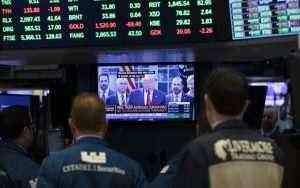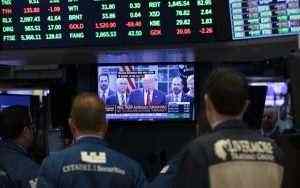
What is securities trading: What are Trading Securities? Definition Meaning Example

The former method enables the company to generate more capital, but it comes saddled with hefty fees and disclosure requirements. In the latter method, shares are traded on secondary markets and not subject to public scrutiny. Both cases, however, involve the distribution of shares that dilute the stake of founders and confer ownership rights on investors. Personal Securities Transactions means any transaction in a Security pursuant to which an Access Person would have a Beneficial Ownership interest with the exception of obligations of the U.S. This is the most common classification used for investments in securities. Each stock share represents fractional ownership of a public corporation, which may include the right to vote for company directors or to receive a small slice of the profits.
For the primary market to thrive, there must be a secondary market, or aftermarket that provides liquidity for the investment security—where holders of securities can sell them to other investors for cash. Otherwise, few people would purchase primary issues, and, thus, companies and governments would be restricted in raising equity capital for their operations. Many smaller issues and most debt securities trade in the decentralized, dealer-based over-the-counter markets.
Ownership of securities in this fashion is called beneficial ownership. Growth in informal electronic trading systems has challenged the traditional business of stock exchanges. Large volumes of securities are also bought and sold “over the counter” .
Stockbrokers are a type of broker who facilitates the trading of stocks. They help find buyers for securities, and they help potential investors source new investment opportunities in the stock market. At a later stage, the note turns into equity in the form of a predefined number of shares that give a slice of the company to investors. Public offerings, sales, and trades of U.S. securities must be registered and filed with the SEC’s state securities departments.
The reasons for listing eurobonds include regulatory and tax considerations, as well as the investment restrictions. Cash DividendCash dividend is that portion of profit which is declared by the board of directors to be paid as dividends to the shareholders of the company in return to their investments done in the company. Such a dividend payment liability is then discharged by paying cash or through bank transfer. Financial StatementsFinancial statements are written reports prepared by a company’s management to present the company’s financial affairs over a given period .
Hybrid Securities
Trading securities are recorded on the asset side of a company’s balance sheet as current assets. However, these assets are temporary since the corporation plans to buy and sell them as soon as possible to make a profit. Balance Sheet Of A CompanyA balance sheet is one of the financial statements of a company that presents the shareholders’ equity, liabilities, and assets of the company at a specific point in time. It is based on the accounting equation that states that the sum of the total liabilities and the owner’s capital equals the total assets of the company. Securities Tradingmeans the trading in securities like real stocks, ETFs as well as other securities that the Company may offer from time to time.
Securities may also be held in the Direct Registration System , which is a method of recording shares of stock in book-entry form. Book-entry means the company’s transfer agent maintains the shares on the owner’s behalf without the need for physical share certificates. Shares held in un-certificated book-entry form have the same rights and privileges as shares held in certificated form. Convertibles are bonds or preferred stocks that can be converted, at the election of the holder of the convertibles, into the ordinary shares of the issuing company. The convertibility, however, may be forced if the convertible is a callable bond, and the issuer calls the bond.

Equity securities do entitle the holder to some control of the company on a pro rata basis, via voting rights. In the case of bankruptcy, they share only in residual interest after all obligations have been paid out to creditors. Sometimes securities are not fungible with other securities, for example different series of bonds issued by the same company at different times with different conditions attaching to them.
Furthermore, debt securities do not have voting rights outside of bankruptcy. In other words, equity holders are entitled to the “upside” of the business and to control the business. Available For Sale SecuritiesAvailable for sale Securities are the company’s debt or equity securities investments that are expected to be sold in the short run and will are not be held to maturity. These are reported on the balance sheet at fair value, and any unrealized gains or losses on these securities are reported in other comprehensive income as a part of shareholders’ equity rather than in the income statement.
Cabinet Securities
When residual security is converted or exercised, it increases the number of current outstanding common shares. Dilution also affects financial analysis metrics, such as earnings per share, because a company’s earnings have to be divided by a greater number of shares. They are typically issued for a fixed term, at the end of which they can be redeemed by the issuer. Debt securities can be secured or unsecured, and, if secured, may be contractually prioritized over other unsecured, subordinated debt in the case of a bankruptcy.

The reason these securities are the fastest moving is that these securities are traded regularly in the open market. And these securities are managed directly by the management of the company to see whether these securities can bring in more profits for the current period or not. Held To Maturity SecuritiesHeld to maturity securities are the debt securities acquired with the intent to keep them until maturity. This type of security is recorded as an amortized cost in the company’s financial statements, treated as debt security with a particular maturity date. As we note from Starbucks SEC Filings, Trading securities include equity mutual funds and exchange-traded funds. In practice, such journal entries would be completed at the end of the current accounting period that the company is in.
In the secondary market, the securities are simply assets held by one investor selling them to another investor, with the money going from one investor to the other. Debt securities may be called debentures, bonds, deposits, notes or commercial paper depending on their maturity, collateral and other characteristics. The holder of a debt security is typically entitled to the payment of principal and interest, together with other contractual rights under the terms of the issue, such as the right to receive certain information. Debt securities are generally issued for a fixed term and redeemable by the issuer at the end of that term.
Market PriceMarket price refers to the current price prevailing in the market at which goods, services, or assets are purchased or sold. The price point at which the supply of a commodity matches its demand in the market becomes its market price. …stock market that handles electronic securities trading around the world. It was developed by the National Association of Securities Dealers and is monitored by the Securities and Exchange Commission . How much a securities trader makes depends on how they make these trades and how successful they are at trading. Bureau of Labor Statistics, registered sales agents of securities, commodities, and financial services have an average annual salary of $93,260.
Self Regulatory Organizations within the brokerage industry often take on regulatory positions as well. Examples of SROs include the National Association of Securities Dealers , and theFinancial Industry Regulatory Authority . City, state, or county governments can raise funds for a particular project by floating a municipal bond issue.
Informal electronic trading systems have become more common in recent years, and securities are now often traded “over-the-counter,” or directly among investors either online or over the phone. Money market instruments are short term debt instruments that may have characteristics of deposit accounts, such as certificates of deposit, Accelerated Return Notes , and certain bills of exchange. The term commonly refers to any form of financial instrument, but its legal definition varies by jurisdiction. In some countries and languages people commonly use the term “security” to refer to any form of financial instrument, even though the underlying legal and regulatory regime may not have such a broad definition. In some jurisdictions the term specifically excludes financial instruments other than equities and Fixed income instruments. In some jurisdictions it includes some instruments that are close to equities and fixed income, e.g., equity warrants.
What Are Treasury Securities?
She is experienced at transforming complex concepts into easily digestible articles to help anyone better understand the world we live in. The offers that appear in this table are from partnerships from which Investopedia receives compensation. Amanda Bellucco-Chatham is an editor, writer, and fact-checker with years of experience researching personal finance topics. Specialties include general financial planning, career development, lending, retirement, tax preparation, and credit.
A transfer of registered securities is effected by amending the register. Reverse EntryReversing entries refer to those journal entries passed in the current accounting period to offset the entries for outstanding expenses and accrued income recorded in the immediately preceding accounting period. From the above discussion, it’s clear that how a company can use a certain amount of money for short-term investments and can gain a lump sum amount at the end of the period. The real gain was $20,000, and by passing the last entry, the investment in trading securities got closed, and United Co. had got a profit of $20,000. The fact that these securities are exchanged frequently—sometimes even daily—on the open market makes them the fastest-moving securities.
Under this rule, it does not matter if a securities offering is formalized with a legal contract or stock certificates; any type of investment offering can be a security. On several occasions, courts have enforced securities provisions on unconventional assets such as whiskey, beavers, and chinchillas. The term “security” refers to afungible, negotiable financial instrument that holds some type of monetary value. A security can represent ownership in a corporation in the form of stock, a creditor relationship with a governmental body or a corporation represented by owning that entity’s bond; or rights to ownership as represented by an option. Bearer securities are completely negotiable and entitle the holder to the rights under the security (e.g., to payment if it is a debt security, and voting if it is an equity security).
This amount won’t be used for any operational purpose or working capital. This money would purely be used for making a quick gain on the short-term investment. Unrealized Gain Or LossUnrealized Gains or Losses refer to the increase or decrease respectively in the paper value of the company’s different assets, even when these assets are not yet sold.
Cash AccountCash Accounting is an accounting methodology that registers revenues when they are received & expenditures when they are paid in the given period, thereby aiming at cash inflows & outflows. Securities Transfer Act means the Securities Transfer Act from time to time in force and all amendments thereto and includes all regulations and amendments thereto made pursuant to that Act. Requests for exceptions to the policy will be provided to the Jennison CCO or her designee and from time to time shared with the Prudential Personal Securities Trading Department and Jennison Compliance Committees.

